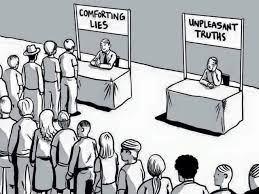 “We’ve created a culture based on lies,” David Brooks says, and they’re the roots of our political problems. Hence we need a cultural revolution more than a political one.
“We’ve created a culture based on lies,” David Brooks says, and they’re the roots of our political problems. Hence we need a cultural revolution more than a political one.
Brooks is the best columnist of our time. Always thoughtful and thought-provoking; not stereotypically “conservative.” A pet theme lately is individualism versus communitarianism. Brooks sees them as oppositional and advocates for the latter over the former. Thus his recent column about cultural “lies.” (https://www.nytimes.com/2019/04/15/opinion/cultural-revolution-meritocracy.html)

I celebrate this. I live it. Blessedly enabled to enjoy a good life according to my own conception — idiosyncratic though it may be.
Is individualism at odds with communitarianism, as Brooks keeps arguing? It can be. He’s right that in some ways individualism can go too far and undermine the social foundation for truly living well. Case in point: an anti-vaxxer, privileging her belief of what’s good for her kid over society’s good. Giving us an epidemic of measles, previously thought eradicated.
But the word that keeps coming to my mind — absent from what Brooks says — is balance. Neither individualism nor communitarianism is wrong. Both are good. We must balance the two. Healthy balance is, indeed, itself key to a good life.

Such balanced perspective is missing from Brooks’s catalog of alleged cultural lies. Here are his headings: career success is fulfilling; I can make myself happy; life is an individual journey; keep your options open; you have to find your own truth; rich and successful people are worth more than poorer and less successful people.

For each he sacralizes the social, with individuation subordinated to it. It reads as though he wants us all to live like bees in a hive. As though the Enlightenment and mass individual empowerment never happened, or were bad things. And we should go back to the conformism imposed by past constraints.

“Career success is fulfilling?” A lie? Brooks claims his making the best seller list “felt like . . . nothing.” Well — it wouldn’t have, for me, as an author, but maybe he’s a saint without an ego. But such success can admittedly be empty if that’s all there is to your life, with no human connectivity. No one on their deathbed says, “I wish I’d spent more time at the office,” yet most aren’t sorry they ever went. Many of us do get much fulfillment from work, it gives our lives meaning — in great part precisely because of its larger social context. Utilizing our abilities productively is empowering, but we also feel we earn our pay because the work contributes to some greater good. Isn’t that the very thing Brooks urges on us?
Similar points apply to Brooks’s other “lies.” They’re not lies but partial truths — for each one he ignores something important.

